In the wake of last Friday's huge quake, Japan received offers of aid from 116 countries, of these offers, it accepted 14 specialized search-and-rescue teams with experience working in extreme conditions.
Larger teams include the U.S. (144 people), France (134 ), South Korea (102) and Russia (75). Other countries who are also present include Australia, Singapore, Germany, Switzerland, New Zealand, Mexico, the U.K. and Taiwan. C hina has also sent a 15-member team to Japan.
The Government of Japan's Emergency Management agencies are leading the response through the Emergency Response Team, which is headed by Prime Minister Naoto Kan.
Though the international NGOs have been urged to wait until search and rescue operations have finished before commencing their activities, 28 international organizations have already offered assistance - including Medecins Sans Frontieres (MSF), the International R...
One week after a deadly tsunami annihilated sections of Japan's northeastern coastline and wiped whole seaside towns off the map, the glare of the world's media attention has now shifted away from footage of surging 15-meter waves of water washing cars away, to focus instead on developments at the badly damaged Fukushima nuclear power plant.
The welfare of the hundreds of thousands of residents left homeless and destitute in the wake of the disaster and the huge operation that has been launched to avert an even greater humanitarian disaster, seem to have been relegated to a page-two story.
As for the search and rescue workers, chances of recovering any survivor among the huge piles of debris has become increasing slim as a week has passed by. In addition, weather conditions in some of the worst hit disaster zones have gradually worsened, making things even harder for rescue teams.
Despite tha...
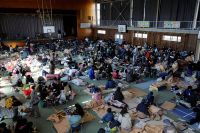 Today we woke to the news that a new fire had broken out at the No. 4 reactor of the Fukushima nuclear plant and live television images of smoke emerging from the nuclear facility screened constantly on the national broadcaster throughout the rest of the morning.
Today we woke to the news that a new fire had broken out at the No. 4 reactor of the Fukushima nuclear plant and live television images of smoke emerging from the nuclear facility screened constantly on the national broadcaster throughout the rest of the morning.
An official press conference at 11am provided frustratingly little in the way of an explanation of the new developments, which helped to further ratchet up the pressure for the many who were glued to their screens seeking updates on developments at the plant and what it might mean for their safety.
As workers and soldiers worked to control the situation at the troubled nuclear plant, many in Tokyo were trying to assess the likelihood that any potential radioactive lea...
It's been a chaotic and unnerving morning. We woke to news that there had been another explosion at the troubled Fukushima Daiichi Nuclear Power Plant, which is located about 240km north of Tokyo.
According to media reports, at 6.10am this morning, there was a blast at the No. 2 reactor of the plant.
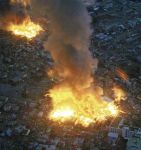 At 11am, the Japanese Prime Minister Naoto Kan held a televised press conference and announced that "substantial amounts of radiation are leaking in the area. We are making utmost efforts to prevent further explosions or the release of radioactive materials." Prime Minister Kan ordered those within 20km of the plant to evacuate immediately and also urged people within 30 kilometers of the plant to stay indoors.
At 11am, the Japanese Prime Minister Naoto Kan held a televised press conference and announced that "substantial amounts of radiation are leaking in the area. We are making utmost efforts to prevent further explosions or the release of radioactive materials." Prime Minister Kan ordered those within 20km of the plant to evacuate immediately and also urged people within 30 kilometers of the plant to stay indoors.
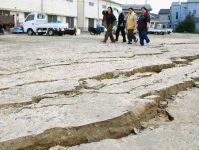 Another small aftershock about 20 min ago (details here )
Another small aftershock about 20 min ago (details here )
In addition to the 6.2 one from this morning, this one was not so bad, just a slight swaying feeling.
Again, an emergency sms message was sent out a few seconds before the earthquake could be felt.
Tokyo seems a little more chaotic today - although they haven't gone ahead with planned blackouts (my hotel was supposed not to have electricity from 13:50 to 15:30).
However, subway has been effected - and a lot of people have not been able to make it to work.
ZFF landed at airport at about 2pm local time but is having trouble getting from airport to center of town...
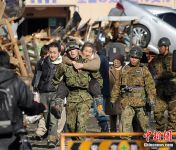 After arriving in what felt like a relatively calm city with a functioning public transport system last night, I awoke to news of rolling power outages across parts of the city, subway line cancellations, my first major tremor as a 6.2 aftershock swayed the building at a bit after 9am, predictions of more large tremors to come, plummeting stock markets and more worrying news from the troubled Fukushima Daiichi nuclear power plant.
After arriving in what felt like a relatively calm city with a functioning public transport system last night, I awoke to news of rolling power outages across parts of the city, subway line cancellations, my first major tremor as a 6.2 aftershock swayed the building at a bit after 9am, predictions of more large tremors to come, plummeting stock markets and more worrying news from the troubled Fukushima Daiichi nuclear power plant.
While searching for details about the reports of the electricity stoppages online in my hotel room, my Japanese mobile phone received an emergency SMS alert and within seconds I could feel the building sway. It was an unnerving sensation, but it did not last long and was not particularly violent.
But the suspicion that there could well be a...
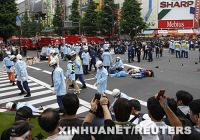 I arrived at Beijing's Capital Airport at just before 6 on Sunday morning and as the grey Beijing morning broke, booked on to a 7.50am Delta Airlines flight 58 to Tokyo.
I arrived at Beijing's Capital Airport at just before 6 on Sunday morning and as the grey Beijing morning broke, booked on to a 7.50am Delta Airlines flight 58 to Tokyo.
The check-in process went relatively smoothly, though the American airline does have stricter security protocols than other carriers, so my suitcase was thoroughly rifled through before I was able to drop it off and get my boarding card.
The flight is a connecting route that continues on through to San Francisco after stopping off at Tokyo to take on more passengers.
The same flight had been cancelled the day before due to concerns about the safety of landing at Narita and a few of the passengers were back for a second round of waiting.
Scanning the waiting room, there were a smatteri...
Interactive
Multimedia

- EEO.COM.CN The Economic Observer Online
- Bldg 7A, Xinghua Dongli, Dongcheng District
- Beijing 100013
- Phone: +86 (10) 6420 9024
- Copyright The Economic Observer Online 2001-2011
















